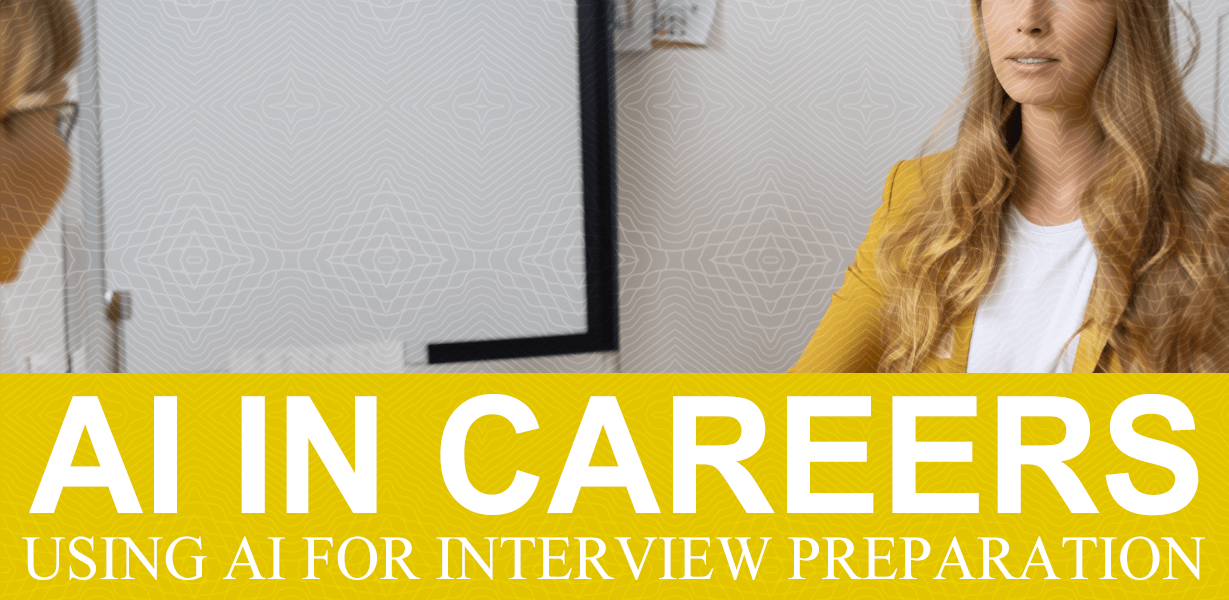As part of our AI in Careers series, this blog examines how the interview process has changed in recent years and how AI can help you prep for this essential part of the application process
Why now?
Interviewing for a job has changed dramatically over the past few years. Due to the COVID pandemic, video interviews became the norm, and a combination of online and in-person interviews are used across a variety of sectors today. As the interview process has rapidly changed, so have the tools you might need to prepare. Generative AI tools (such as ChatGPT and Bard) are just some of many tools you can capitalise on to prepare for your interview.
How can you use generative AI to help you prepare for your interview?
One of the starting points for preparing for your interview is to try to anticipate what questions you will be asked. Although question banks exist, and can be tailored to a specific type of job, using an AI tool can really enhance the specificity of these types of questions. For example, you can put the specific wording from the job advertisement, including the essential and desirable criteria, into the prompt and ask for potential interview questions.
Example prompt: “Generate interview questions for {job title/description} requiring {essential and desirable criteria}”
Although it isn’t always explicitly stated, there are character limits on how much you can put into one prompt. You can add more information from a particular job ad as long as it is within the same conversation. Remember that you don’t need to be polite to AI tools, so conversational phrases such as “can you please…” can be removed.
There are many webpages advising using a chat bot to develop answers for interview questions. However, overpreparing specific answers in advance is not always very helpful. You can also use generative AI to develop the structure of your interview answers based on your specific experience. You can try to input bullet points from a section of your CV and ask the AI tools to format it into the structured answer (eg, STAR technique for competency questions.)
Example prompt: “For the behavioural interview question “Tell me about a time when you delivered an important project under a tight deadline?” Provide me with an answer to the question using the STAR format based on my experience {insert experience from CV}.”
Sometimes one of the most challenging things to do in preparation for an interview is not the questions you need to answer but coming up with questions to ask the interviewers. If you input information about the organisation and the job role, you can prompt the AI tool to produce questions for you to ask.
Example prompt: “For {job role/description} at {organization name or website}, generate questions I can ask of the interviewer.”
Remember that generative AI is always producing slightly different results, and it is important to sense check your results, both by reading it aloud to yourself as well as asking others to take a look. If you have an interview preparation appointment a member of the Careers Service staff, you can upload your AI tool results in advance and discuss them with a Careers Consultant, who can help you further develop your questions and answers.
What not to do
Finally, it should go without saying, but in a virtual interview setting, we strongly advise you not to use generative AI tools in real time. The purpose of an interview is about seeing how you think and how you would respond in potential situations. Trying to use ChatGPT or something similar in real time will actually make you come across as unnatural and unprepared. Hopefully you are reading this and having a laugh, but recently the University Information Services was interviewing a candidate doing exactly this! An interview is more like a conversation, not an examination, so you want to focus on explaining how you think and come up with your answers rather than focussing on what is a “right” answer.
In summary, generative AI tools can be used to help you anticipate interview questions with more specificity than a general bank of questions. You can also refine the structure your answers and develop potential questions for the interviewers. However, use caution when using these AI tools for interview preparation and never use them in real-time during an interview.

